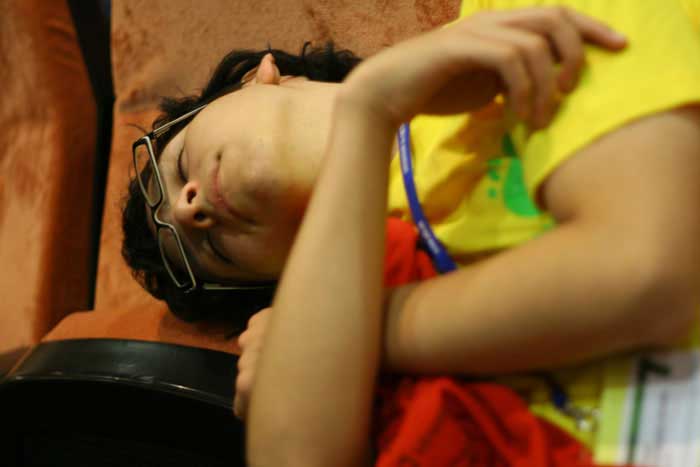To battle the fatigue of traveling through multiple time zones, follow three steps concerning food, time and light. First, as to time, trick your body into thinking it's in the time zone of your destination by resetting your watch to that time as soon as you are on the place. Try to only sleep if it's night at your destination. In terms of food, eat less. If you are offered food, eat less half or less. You are better off eating an appropriate meal at your destination. As to the light, never sleep unless it's dark outside. If it's light out, stay away. If it's dark, prepare to sleep even if you are not tired.
Experts advise to put yourself on the time zone of your destination. Most people sleep best in their bed, and ideally if would be recommended to shift at home. If flying east, passengers should move bedtime earlier and if flying west they should progressively move bedtime later if possible. However, business travelers don't usually rarely have the luxury to get used to a timezone beforehand.
If you are a business traveller that always opts for first and business class seats, you are already one step ahead. These sections not only offer nicer meals and cocktails but they are also set up with wider seats, deeper recline and more space to stretch your legs, so you can sleep more comfortably.
However, if this time you decided to go for a cheaper fare, that can work too. Just choose an exit row seat so you can stretch your legs again and be more comfortable to sleep. Also choose a window seat as you can rest your head on a pillow you have previously placed on the window. Besides, if you have to go to the toilet, you'll be the one disturbing other passengers instead of having others waking you up while you sleep. Avoid seats in traffic areas such as galleys and lavatories where the commotion will keep you up.
If you have a 7 or 8 hours or more on the plane, a sleeping pill might be useful. However, if your flight is shorter than that the drowsy effects of the sleep aid may linger once your reach your destination and this could affect your sharpness during your business meeting or conference. If you do decide to take those meds, just consult your doctor beforehand.
Avoid caffeine before flying as it stays in the system several hours after consumption which might reduce your possibilities of sleeping on the plane.
If you, like most of the people, suffer from environmental insomnia - lack of sleep caused by immediate conditions - you might want to consider carrying with you eye masks, neck pillows, ear plugs, comfortable clothing and a blanket. Check if your airline offers blankets in your selected class; otherwise, bring your own.
If you have an overnight flight across an ocean or across at least two time zones, it is not recommended to go straight to your business meeting. It is recommended that you allow at least one-half to three-quarters of a day in your new surroundings so your body can adjust to the environment before you do anything important or business-related.
Overall, everyone reacts to changing time zones differently, so you have to figure out what your body needs to avoid jet lag. Some general tips include taking later flights so you can sleep overnight and staying well hydrated during the flight. To achieve that purpose, avoid alcohol - even though it might help you to fall asleep quickly, it will actually dehydrate you, deprive you of a deep sleep and make jet lag worse.

